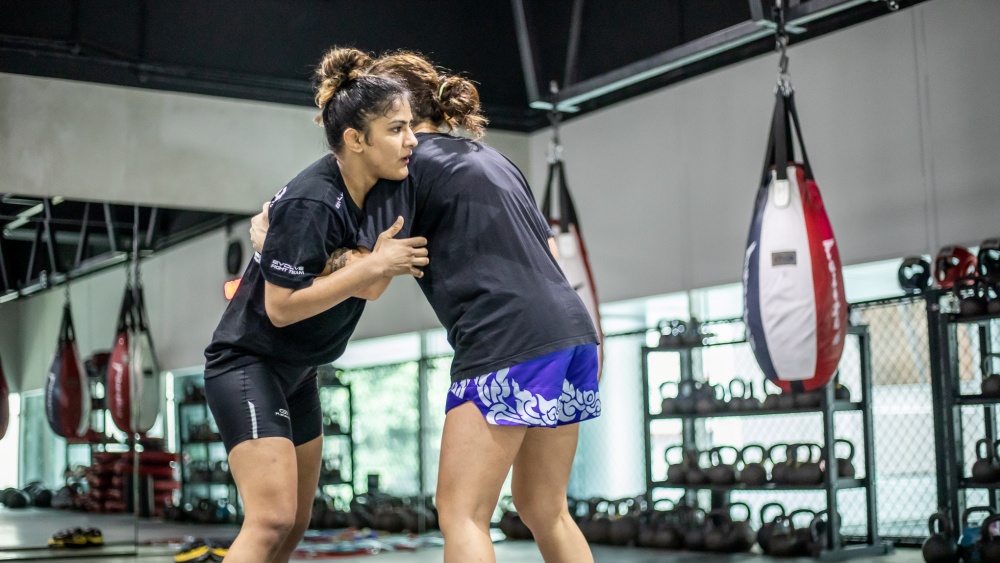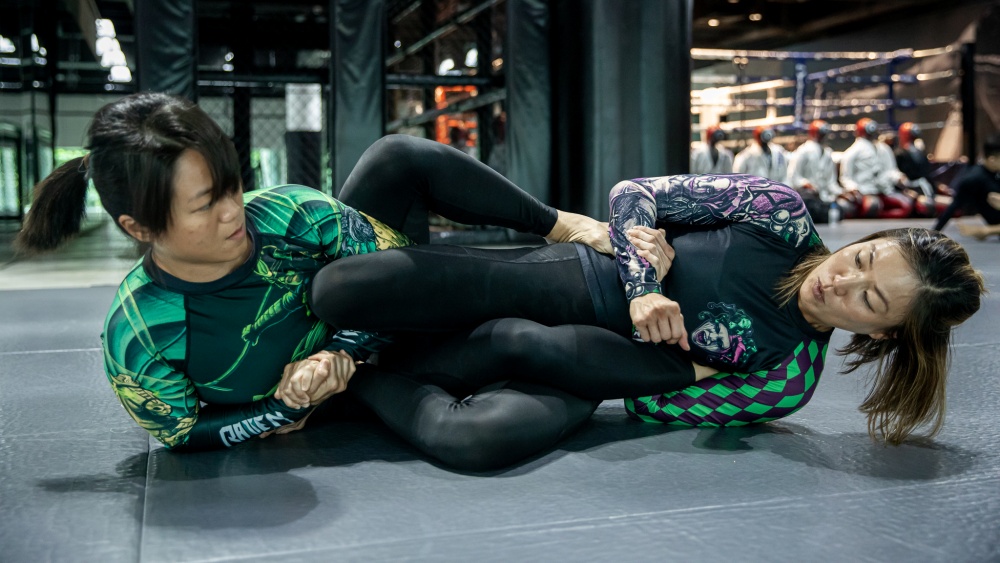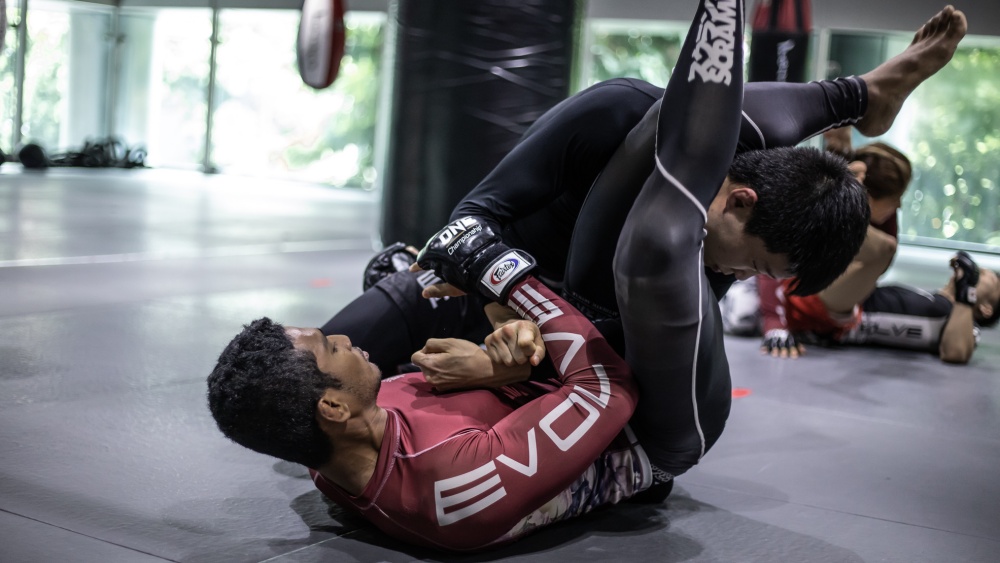Guest post by Evolve MMA, Asia’s premier championship brand for martial arts. It has the most number of World Champions on the planet. Named as the #1 ranked martial arts organization in Asia by CNN, Yahoo! Sports, FOX Sports, Evolve MMA is the top rated BJJ gym in Singapore.
The first thing that most people think of when discussing Brazilian Jiu-Jitsu is the gi. While that may be true, no-gi has gained a lot of traction over the past few years. More and more athletes are now switching to no-gi BJJ as it is a more dynamic grappling style. No-gi BJJ leads to more activity and can be more exciting to watch, especially compared to its contemporary. Several underlying concepts apply in both gi and no-gi BJJ, but let’s explore the ones that greatly benefit your no-gi game.
Today, Evolve Daily shares 5 concepts to quickly improve your no-gi grappling.
No-Gi BJJ Defined
Sometimes referred to as submission grappling, no-gi is a style that requires you to grapple with a shirt or rash guard and shorts. Although both gi and no-gi share the same techniques, they sometimes differ in application. Some techniques provide leverage and generally work better when the gi is used as a tool for control. This means your approach should adjust depending on the game you play.
No-gi grappling combines various grappling disciplines, gathering techniques from BJJ, wrestling, judo, and sambo. It is a style that allows more freedom in terms of options and is definitely an exhilarating variant of BJJ.
Concepts To Improve Your No-Gi BJJ
To quickly improve in no-gi BJJ, you must set goals by creating a blueprint for you to follow. Do you want to revolve your game around pressure passing? Do you want to be the leg locker? Do you want to use wrestling to grind out your opponents? You can do all of these and more with no-gi BJJ! Below are some concepts that you may use to quickly improve your no-gi game.
1) Learn To Wrestle
A big aspect of the stand-up game in no-gi is wrestling. After scoring a successful takedown, having the ability to control and pin your opponent down will give you a better opportunity to apply submissions. Practicing wrestling will enable you to start and finish takedowns efficiently, other than the mental fortitude that it offers.
All matches start from the standing position. Learning how to perform takedowns will give you the confidence to dominate at the onset. Working on takedowns will provide you with more opportunities to rack up the points and will put your opponent in compromising positions. The idea of wrestling to work on your offense and not laying on your back will benefit grapplers significantly.
Similar to positional drilling, incorporating wrestling drills to BJJ must go with resistance. As John Danaher said in his interview with Lex Fridman, drilling should not solely focus on accomplishing a specific volume. Instead, it should be focused on drilling with gradual resistance. Athletes must understand the purpose and problems they’re trying to solve through drilling.
2) Determine Your Physical Attributes
Determining the attributes you can use to benefit your game: this includes speed, explosiveness, strength, flexibility, and the length of your limbs. These will help you understand the techniques and game that suits you best. This does not mean that you should not attempt triangles if you have short legs, as triangles can be finished through proper angles. This means that specific techniques may be better suited to your game based on your physical attributes.
To give an example, a smaller grappler may get overpowered if you fight strength with strength. A better approach is to use your unique attributes (such as speed) to get to good positions or pass the guard. Likewise, if you are a bigger and stronger grappler, you may work on pressure passing techniques and learn how to use your body weight to pin the opponents in side control.
Again we need to elaborate that you should not limit your game based on your physical attributes. Feel free to explore different techniques and see where your strengths and weaknesses lie. The examples above are just basic guidelines, and your mileage may vary.
3) Guard Retention
Guard retention may be one of the most valuable concepts a no-gi grappler can learn. Unlike in the gi, where you can apply certain grips to negate your opponent from passing, learning guard retention in no-gi is crucial. An excellent guard will exhaust your opponent faster, especially when attempting to relentlessly pass, leaving him more vulnerable to your counterattacks. Guard retention includes distance control and tactics such as framing, posting, extending your legs, inverting, and performing a knee shield to stop guard passing and recovery. These are essential concepts for no-gi grapplers to incorporate into their game.
4) Watch BJJ Athletes With Similar Games
This concept is useful when you can’t physically train or are off the mats but are still looking to improve. Studying videos of BJJ athletes who are successful with the style and techniques you want to add to your game will make it easier for you to progress. An example is studying the likes of Marcelo Garcia and Gordon Ryan if your goal is to learn the butterfly guard. Learn how the masters do it and it will help improve your techniques in the position.
Watching videos where you see techniques applied perfectly is very beneficial. You can also use these videos to help your visualization. This can be done by putting yourself in the competitor’s shoes. Think about how you would react or adjust to the opponent’s movements and, from there, form a plan of attack.
5) Focus On No-Gi Training
This is no secret. If you have been training both in the gi and without the gi, giving more time to training no-gi will undoubtedly help you quickly improve overall. Gi and no-gi BJJ have overlapping concepts like mentioned above, but at the end of the day, these are still two different styles of grappling. If you want to get good at no-gi BJJ, then train in no-gi BJJ more. Some competitors can do both with no issues, but it’s best to examine what works best for you. Start by adding one or two no-gi days to your schedule and adjust from there.
Final thoughts
Having a deep understanding of your strengths, weaknesses, goals, and attributes will help you understand and build your unique style of no-gi BJJ. Recognize that there are no shortcuts; improving takes time and may even take years to perfect. Do not get frustrated in the process, and enjoy the journey!
The post Which Concepts To Implement For Quick Improvements in No-Gi BJJ appeared first on Bjj Eastern Europe.



